Overview
To obtain a title report, real estate professionals must adhere to a structured process. This process involves:
- Selecting a reputable title company
- Gathering the necessary property information
- Meticulously examining the received document for any discrepancies
The significance of these steps cannot be overstated; a precise title report is essential for confirming ownership and preventing potential legal disputes. Consequently, this diligence ensures a smooth transaction.
Introduction
Navigating the complex world of real estate transactions necessitates a clear understanding of title reports—an essential document that provides critical insight into a property's legal standing. These reports not only disclose ownership histories and potential liens but also illuminate any encumbrances that could impact a buyer’s rights.
For real estate professionals, grasping the intricacies of title reports is vital to safeguard against unforeseen legal disputes and financial liabilities. Furthermore, as the industry evolves, the importance of accurate title searches and the role of technology—particularly AI—in streamlining these processes cannot be overstated.
This article explores the key components of title reports, the steps to obtain them, cost considerations, common challenges faced, and the indispensable role of title insurance, equipping readers with the knowledge necessary to navigate real estate transactions with confidence.
Understanding Title Reports: What You Need to Know
An ownership document is a crucial paper that provides a comprehensive summary of a real estate's legal condition, including its ownership history, any liens or encumbrances, and other relevant legal details. This document is essential for real estate experts, as it confirms the seller's legal authority to sell the asset and reveals any concealed problems that could jeopardize the transaction. The key components of a title report include:
- Property Description: This section offers a precise description of the property, including its boundaries and any improvements made, ensuring clarity on what is being sold.
- Ownership History: A chronological account of all previous owners establishes the chain of title, which is vital for confirming ownership and identifying any potential disputes, as well as understanding how to obtain a title report.
- Liens and Encumbrances: This section outlines any financial claims against the asset, such as mortgages, unpaid taxes, or judgments. Understanding these claims is critical, as unresolved liens can lead to significant financial liabilities for the buyer.
- Easements: Information concerning any rights others may possess to utilize the land is included here. Easements can influence the value and usability of the estate, making it crucial for buyers to be informed about them.
Recent statistics indicate that a significant percentage of real estate professionals depend on document reports to facilitate smooth transactions and prevent disputes. For example, clearing experts play an essential role in communication to avoid disputes over boundary lines between adjacent landowners. Furthermore, the subsequent actions following a search for ownership, including understanding how to obtain a title report, rely on its result; claims or easements must be resolved prior to mortgage approval, while clear ownership permits moving forward with the acquisition.
Case studies have demonstrated that unresolved ownership issues, such as liens or boundary disputes, can lead to financial liabilities or even hinder the completion of a property purchase. The case study titled 'Consequences of Unresolved Title Issues' illustrates that failure to resolve these issues can lead to significant financial liabilities for the buyer or even the inability to complete the purchase, highlighting how to obtain a title report and the importance of a thorough title search. Consequently, comprehending these elements is not only advantageous but essential for real estate experts to manage dealings efficiently and reduce possible legal conflicts.
As Demetrios Berdousis noted, "IBISWorld has been a leading provider of trusted industry research for over 50 years to the most successful companies worldwide," underscoring the importance of reliable information in real estate transactions.
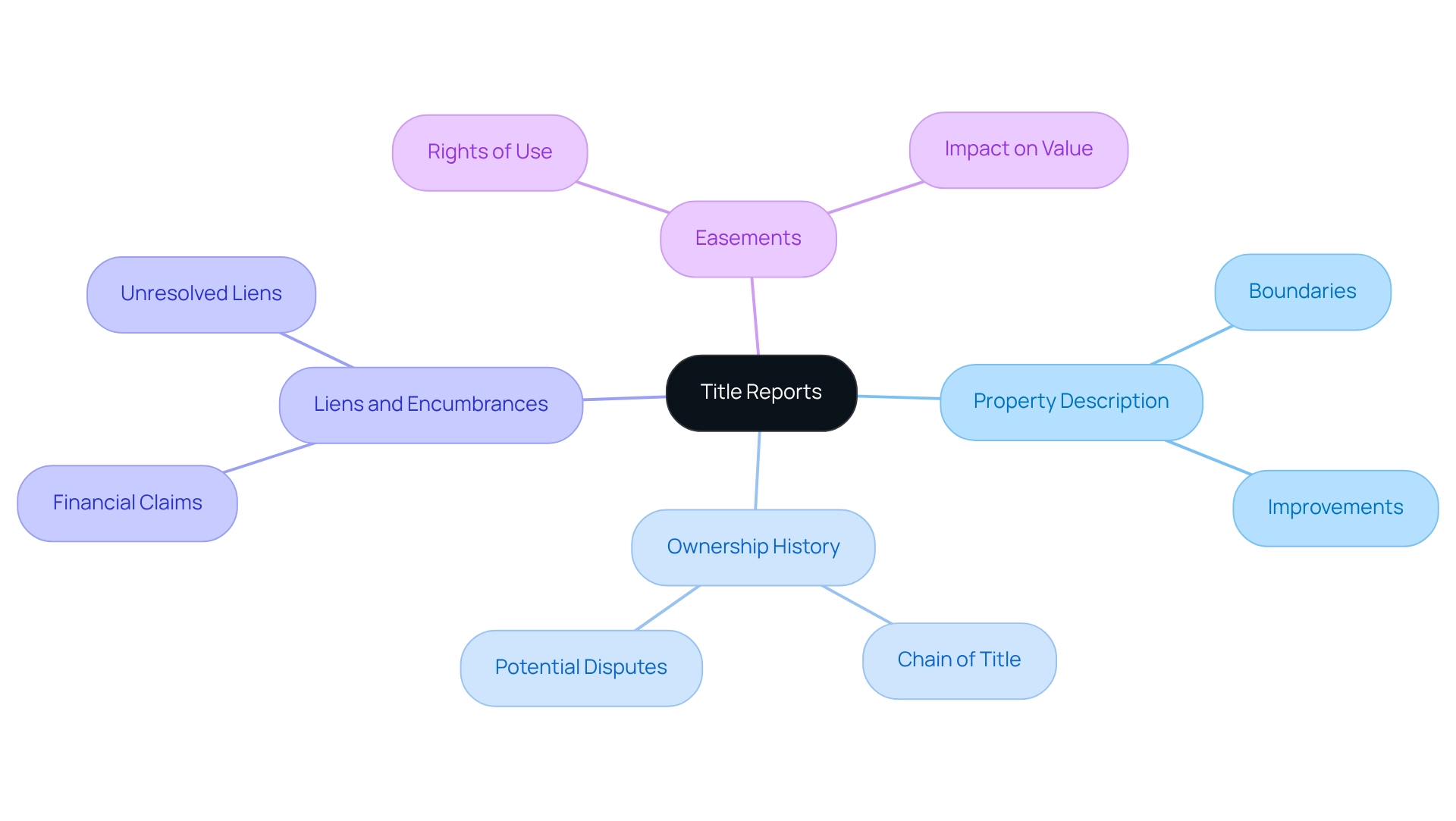
Step-by-Step Process to Obtain a Title Report
To successfully obtain a title report, follow this structured approach:
- Select a Reputable Title Company: Begin by researching title companies recognized for their reliability and efficiency. Seek out reviews and ask colleagues for recommendations to ensure you choose a company with a solid reputation in the industry. In a market characterized by high and decreasing competition, selecting the right partner is crucial for a smooth transaction process.
- Gather Necessary Information: Compile all relevant details about the asset in question. This encompasses the real estate address, parcel number, and any prior ownership details you might possess. Having this information ready will streamline the ordering process.
- Submit Your Request: This is an important step in understanding how to get a title report. Contact your selected company to inquire about obtaining a title report for document assessment. Provide them with the gathered information and clearly specify any particular concerns or requirements you may have regarding the property.
- Examine the Document: Upon receiving the ownership document, conduct a thorough evaluation. Pay close attention to any discrepancies or issues that may arise, as these could impact the transaction. Addressing these concerns early can prevent complications later on. The significance of acquiring precise ownership documents is emphasized by the reality that commercial real estate investments have excelled beyond most other asset categories over every five-year period since 1998.
- Seek Guidance from Experts: If you encounter complicated problems within the document, it is recommended to consult with a real estate lawyer or a document specialist. Their guidance can help clarify any uncertainties and ensure that you are making informed decisions.
In 2025, the average expense of acquiring a report varies, but it is crucial to compare costs between residential and commercial properties, as these can differ significantly. Engaging with reputable firms not only ensures accuracy but can also lead to significant cost savings compared to traditional methods, such as those offered by Parse AI. As the insurance sector progresses, especially with diminishing competition, choosing the appropriate partner is essential for a seamless process.
Furthermore, with the spring homebuying season approaching, recent enhancements in mortgage rates might encourage homebuyers to return to the market, boosting the demand for property documents. Additionally, strategic planning is crucial in real estate dealings, as emphasized in the case study 'Risks of Obsolescence in Real Estate,' which explores the possible obsolescence of current office spaces due to evolving usage patterns and sustainability demands.
Cost Considerations: How Much Does a Title Report Cost?
The expense of acquiring a title document can fluctuate significantly due to various factors, including the asset's location, the complexity of the title history, and the title firm selected. Understanding these factors is crucial for real estate professionals preparing for property transactions. Generally, the following price ranges can be anticipated:
- Residential Properties: Title report costs typically range from $100 to $250. This range reflects the straightforward nature of most residential transactions, where ownership histories are often less complex.
- Commercial Properties: In contrast, for more intricate transactions, costs can surpass $1,000. The complexity of commercial properties often requires extensive ownership records and additional due diligence, which can escalate expenses.
- Additional Fees: It is essential to recognize that there may be supplementary charges for expedited services, document retrieval, or specific searches, such as lien searches. These fees can contribute to the overall cost, making it imperative to clarify them upfront.
In 2025, pricing trends indicate a growing awareness among real estate professionals regarding the importance of budgeting for these documents. Experts emphasize the necessity of obtaining detailed quotes from property companies to avoid unforeseen expenses. As Rande Yeager, president of the American Land Association, notes, "This clearly illustrates the significance of a professional property search in all real estate dealings, whether buying a new home or refinancing an existing mortgage."
Moreover, variations in document costs can be observed across different regions, influenced by local market conditions and the prevalence of typical issues discovered during document searches. For instance, statistics reveal that certain areas may experience higher instances of liens and encumbrances, complicating ownership searches and subsequently affecting pricing. Additionally, it is vital to acknowledge that the average expense for other claim categories is approximately $26,000, underscoring the relative affordability of documentation in comparison to potential financial losses from ownership disputes.
By grasping these dynamics, real estate professionals can make informed decisions and effectively manage their budgets when determining how to obtain a title report.
Furthermore, while fraud and forgery in real estate transactions are less common, they can result in significant financial losses. Offenders may impersonate landowners to deceitfully sell properties. Title insurance provides protection against such fraudulent activities, ensuring that property owners are safeguarded from losses arising from ownership issues.
By recognizing these risks, real estate professionals can better appreciate the importance of conducting thorough property searches.
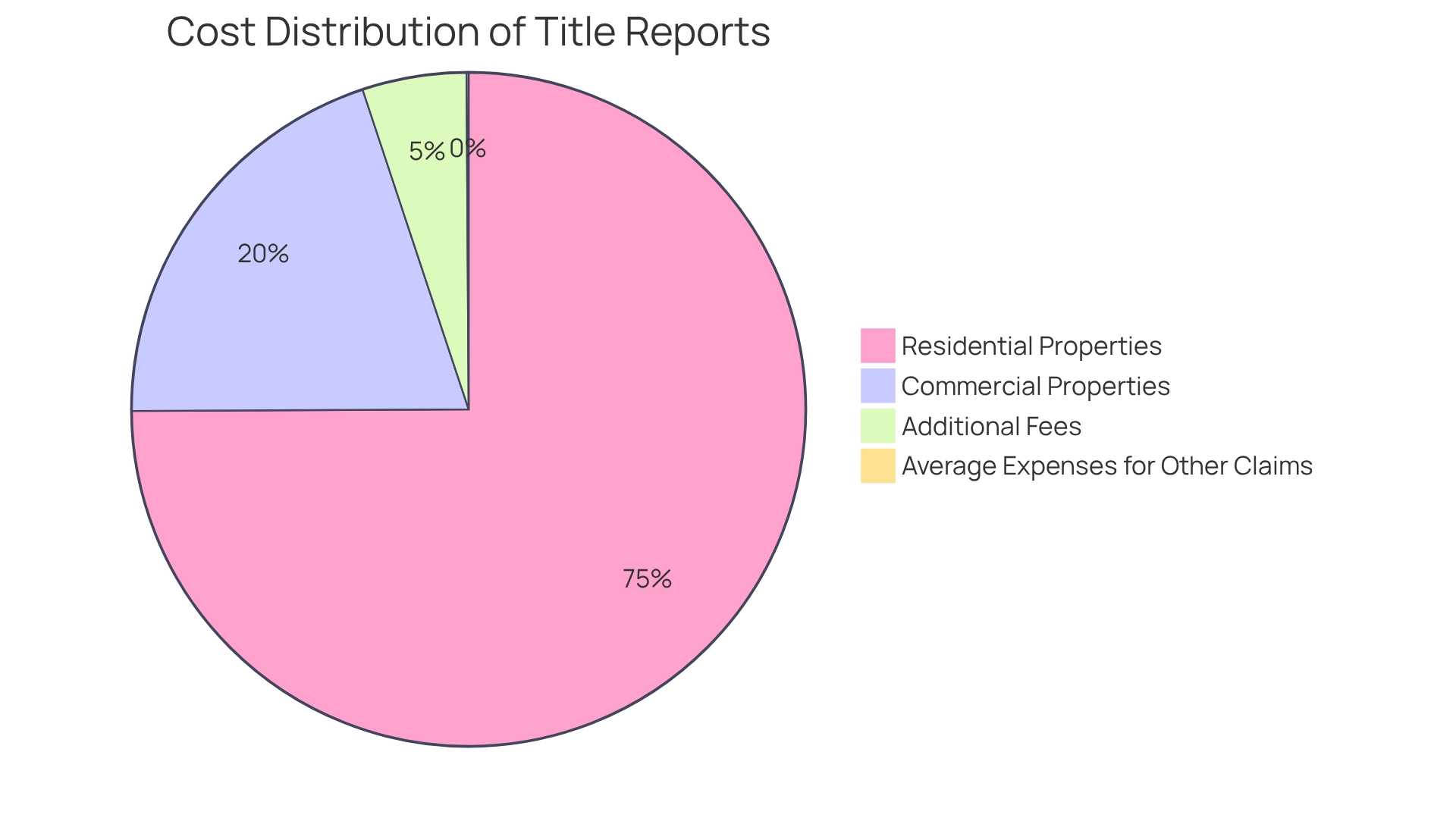
Common Issues Found in Title Searches and How to Resolve Them
During an ownership search, several typical issues may arise that complicate real estate transactions. Understanding these challenges and having a proactive plan to address them is crucial for a smooth closing process. Key issues include:
- Liens: Unpaid taxes or mortgages can create significant obstacles in the title search. To resolve this, it is essential to ensure that all debts are settled before closing. Failure to address liens can lead to costly delays and legal complications.
- Errors in Public Records: Mistakes in recorded documents can result in disputes over property ownership. If mistakes are found, collaborating closely with the documentation firm to rectify them quickly is essential. This partnership can avert possible legal problems and guarantee clear ownership.
- Missing Heirs: When an asset owner passes away, locating all heirs can be challenging. In such cases, legal assistance may be required to clear the title and confirm rightful ownership. Engaging with legal professionals early in the process can expedite resolution and mitigate risks.
- Easements and Restrictions: These can impose limitations on how a piece of land can be utilized. It is important to review any easements carefully and consult with legal counsel if necessary to understand their implications fully. This diligence can help prevent future disputes and ensure adherence to usage regulations.
Awareness of these issues, coupled with effective strategies for resolution, can save time and prevent complications during the closing process. Recent discussions among industry stakeholders emphasize the significance of collaboration in tackling these challenges, ultimately benefiting consumers and improving the overall insurance process. As Diane Tomb, CEO, noted, "Title professionals across the country continue to navigate their businesses through this challenging and volatile real estate cycle, dedicated to serving their customers, protecting property rights and supporting their communities despite the uncertainty of the marketplace."
Furthermore, employing solutions such as Parse AI can offer substantial cost reductions in comparison to conventional research methods, assisting in easing some of these difficulties. Moreover, the regulation of insurance rates in the U.S. highlights the financial implications of ownership issues, making efficient resolution even more critical.
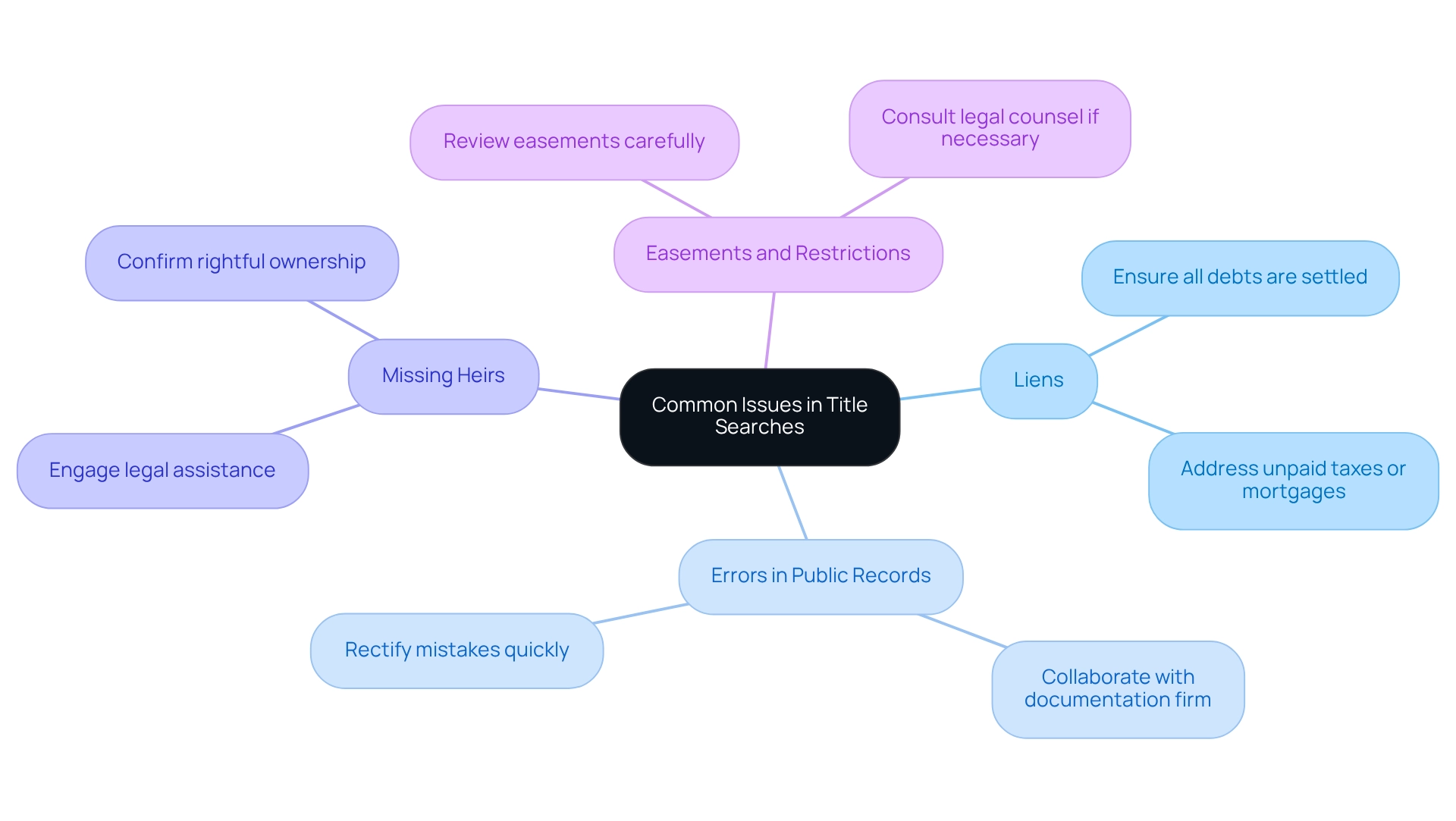
The Role of Title Insurance in Real Estate Transactions
Title insurance is a crucial policy that protects real estate purchasers and lenders from financial losses arising from issues in ownership. Its significance in real estate transactions cannot be overstated, as it serves several vital functions:
- Protection Against Claims: Title insurance provides robust protection against claims from previous owners or unknown heirs who may assert ownership rights, ensuring that buyers are shielded from potential disputes.
- Coverage for Legal Fees: In the event of a property dispute, the policy covers legal fees incurred while defending against claims, alleviating the financial burden on the property owner.
- Peace of Mind: With ownership insurance, buyers gain peace of mind, knowing they are protected from unforeseen issues that could surface after the purchase. This assurance is particularly important in a market where the ownership insurance industry has experienced a steady growth rate of 2.9% annually from 2019 to 2024.
In most real estate transactions, understanding how to get a title report is not merely a recommended practice; it is often a necessity established by lenders. This necessity emphasizes the importance of conducting comprehensive ownership searches and highlights how to obtain a title report. Statistics show that title companies conduct a considerable number of these investigations compared to real estate lawyers. Furthermore, insurance rates in the U.S. are primarily regulated by states, with varying regulations on whether rates must be approved prior to use or filed after use.
As the landscape of property insurance evolves, staying informed about recent developments in policies and coverage is vital for real estate professionals. Expert opinions consistently emphasize that ownership insurance is a crucial element in safeguarding purchasers, making it an essential aspect of the real estate process. As Demetrios Berdousis notes, "IBISWorld has been a leading provider of trusted industry research for over 50 years to the most successful companies worldwide."
Moreover, additional study on Iowa's practices could offer valuable insights for regulators and policymakers in the realm of insurance.
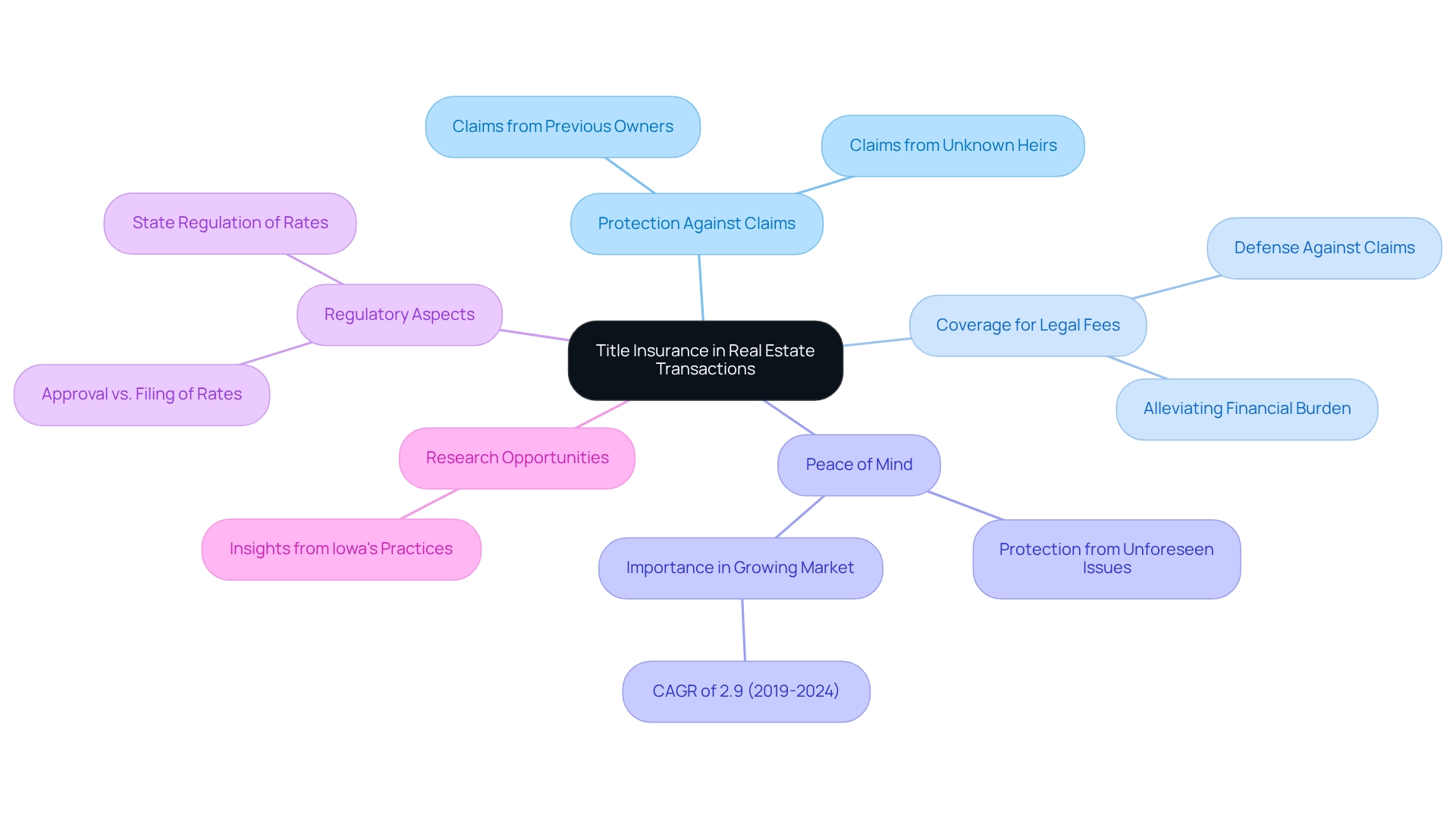
Who Can Conduct a Title Search? Understanding Your Options
A title search is a critical process that can be conducted by several types of professionals, each bringing unique expertise to the table:
- Title Companies: These organizations are the most common choice for real estate transactions. They focus on performing comprehensive property searches and offering ownership insurance, ensuring that any potential problems with property rights are recognized and resolved. Their extensive experience in the field allows them to navigate intricate ownership histories efficiently.
- Real Estate Lawyers: Lawyers not only conduct property searches but also provide legal advice concerning any issues that may arise during the process. Their legal knowledge is essential, especially in dealings that may involve disputes or complex ownership histories.
- Independent Abstractors: These specialists concentrate specifically on investigating property records and can be employed for targeted searches. They often work independently or as part of a larger team, providing flexibility for real estate professionals who may need specialized services.
When choosing a specialist to perform a property search, it is essential to consider their experience, reputation, and the specific requirements of your transaction. Recent statistics suggest that over 80% of real estate occupants, investors, and developers intend to raise their technology expenditures in the next three years, emphasizing the increasing significance of effective property search procedures. Furthermore, the implementation of AI in document searches is revolutionizing the sector, with considerable time savings noted by those employing these advanced technologies.
Over two-thirds of marketers believe AI tools meet or exceed expectations, indicating a positive perception of these technologies. As Tom Bradbury, a content marketing expert, notes, "This is a compilation of the most up-to-date stats on artificial intelligence (AI)." As the landscape evolves, understanding the roles of deed companies, attorneys, and abstractors will empower real estate professionals to make informed decisions that enhance their transaction efficiency.
Leveraging Technology: How AI is Transforming Title Searches
Artificial intelligence (AI) is fundamentally transforming the title search process, offering significant advancements in several critical areas.
- Speed and Efficiency: AI technologies can swiftly analyze extensive collections of title documents, drastically cutting down the time needed to complete a title search. This rapid processing allows real estate professionals to respond to client inquiries more promptly, enhancing overall service delivery.
- Accuracy: Utilizing machine learning algorithms, AI can identify patterns and discrepancies within document records, thereby enhancing the accuracy of searches. This capability not only reduces human error but also ensures that researchers can trust the integrity of the information they provide.
- Cost Savings: By automating repetitive and time-consuming tasks, AI significantly reduces the expenses related to document searches. This makes the process more accessible for real estate professionals, allowing them to allocate resources more effectively and improve their bottom line.
As Steve Polyak aptly stated, "Before we work on artificial intelligence why don’t we do something about natural stupidity?" This emphasizes the significance of utilizing AI to improve decision-making processes in document examination.
The incorporation of AI into document research is not merely a trend; it signifies a crucial change towards more efficient workflows and improved client service. As we progress through 2025, the continuous improvements in AI technology promise to further enhance searches, making them quicker, more precise, and economical than ever before.
FAQs: Common Questions About Title Reports Answered
Commonly Asked Questions About Ownership Documents
- What is the difference between an ownership document and a preliminary ownership document?
A title report serves as the definitive document detailing the legal status of a property, encompassing all findings from the title search. In contrast, a preliminary document is an initial evaluation that outlines the findings before the final version is issued, often highlighting potential issues that may need resolution. - How long does it take to obtain a document?
The timeframe for obtaining a title report can vary significantly based on the complexity of the title history. Typically, the majority of document reports are finalized within a few days to two weeks. However, more complex cases might necessitate extra time for comprehensive examination and resolution of any inconsistencies. - Can I perform a search of the ownership myself?
While it is possible for anyone to conduct a title search using public records, it is advisable to engage a professional. Specialists have the essential abilities and tools to guarantee a thorough and precise search, reducing the chance of missing important details. - What should I do if I find an issue in the document?
If you encounter any discrepancies or issues within the title report, it is crucial to consult with a title company or a real estate attorney. They can offer advice on how to tackle these issues efficiently, making sure that all matters are settled before moving forward with the transaction. - What are some common misunderstandings about ownership documents?
Many real estate professionals mistakenly believe that title reports are infallible. However, discrepancies can arise, and recognizing that these documents are based on available records is essential. Frequently, statistics show that inconsistencies in document assessments can occur, highlighting the significance of comprehensive evaluations and expert supervision. Indeed, recent information indicates that inconsistencies in document summaries happen more often than many understand, with a significant portion of dealings facing some kind of problem. This statistic strengthens the necessity for carefulness in reviewing documentation and addressing potential issues early in the transaction process. - What is the average time taken to resolve documentation issues?
The average time to resolve issues identified in title reports can vary widely, often ranging from a few days to several weeks, depending on the nature of the problem and the responsiveness of the parties involved. - What do real estate professionals say about title report timelines?
Many professionals in the field share experiences highlighting that while title reports can be obtained relatively quickly, the resolution of any issues can extend timelines significantly. This emphasizes the significance of proactive communication and collaboration with documentation companies to expedite the process. - What are the statistics on the frequency of discrepancies in the documentation?
Recent data suggests that discrepancies in title reports occur more frequently than many realize, with a notable percentage of transactions encountering some form of issue. This statistic strengthens the necessity for careful examination of ownership documents and tackling possible issues early in the process. As previously mentioned, the title report is the final document that confirms the legal status of a property, while the preliminary title report serves as an initial overview, indicating findings that may require further investigation before the final report is issued. - What are the financial implications of title report discrepancies?
In 2023, 48.2% of renters spent 30% or more of their income on rent and utilities, highlighting the financial stakes involved in property transactions. Mistakes in ownership documents can result in considerable financial consequences, making it vital to guarantee precision and comprehensiveness in the ownership research process. - Why is precision in ownership documents crucial?
As Leonard Berlin noted, preventable errors can have serious consequences. In the context of ownership documents, errors can result in conflicts, monetary loss, and delays in property dealings. Consequently, upholding high standards in document research is crucial to prevent such missteps. - How does variability in document accuracy relate to quality enhancement?
Similar to the findings in the case study on the statistical distribution of radiological performance, which suggests that most performers are below average, the accuracy of title reports can also vary significantly. This underscores the need for quality improvement programs in title research to enhance overall performance and reduce variability.
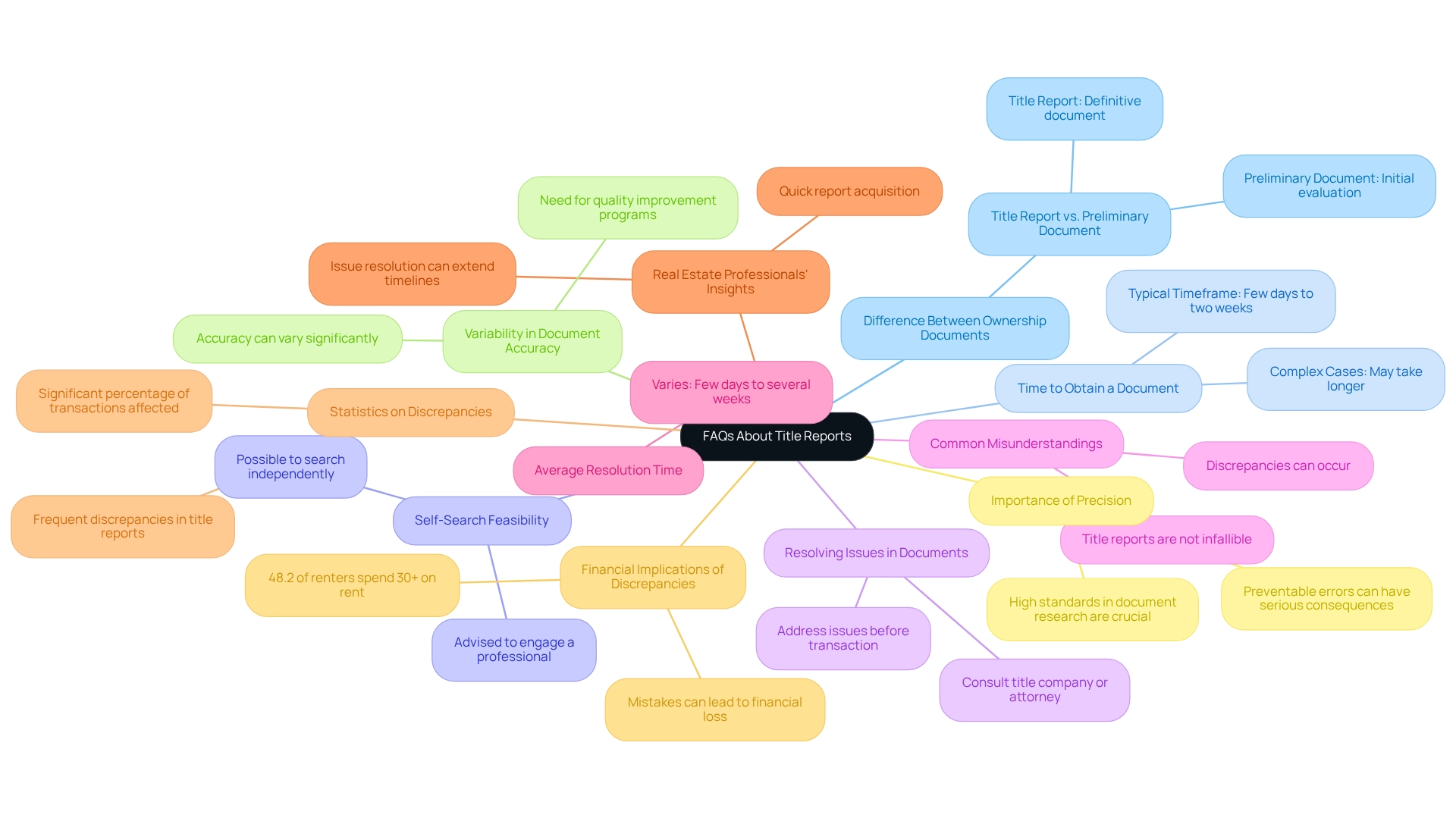
Conclusion
Understanding the intricacies of title reports is essential for anyone involved in real estate transactions. These documents provide a comprehensive overview of a property's legal status, revealing ownership histories, liens, easements, and potential encumbrances that could affect a buyer's rights. With the right knowledge, real estate professionals can navigate these complexities effectively, mitigating risks associated with legal disputes and financial liabilities.
The process of obtaining a title report involves:
- Selecting a reputable title company
- Gathering necessary property information
- Reviewing the report thoroughly for any discrepancies
Awareness of the costs associated with title reports—ranging from $100 to over $1,000 depending on the property type—helps professionals budget effectively. Furthermore, understanding common issues that may arise during title searches, such as liens or errors in public records, equips professionals with strategies to resolve them proactively.
Moreover, the role of title insurance cannot be understated. It provides crucial protection against claims from previous owners and covers legal fees in case of disputes, offering peace of mind to buyers. As technology continues to evolve, particularly with the integration of AI in title searches, the efficiency, accuracy, and cost-effectiveness of these processes are set to improve significantly.
In summary, a thorough understanding of title reports and the surrounding processes is vital for real estate professionals. By leveraging reliable information, utilizing technology, and ensuring comprehensive title searches, they can protect their clients and facilitate smoother transactions. Consequently, as the real estate landscape continues to change, staying informed and proactive will remain key to achieving success in this complex industry.
Frequently Asked Questions
What is an ownership document in real estate?
An ownership document is a crucial paper that summarizes a real estate's legal condition, including its ownership history, any liens or encumbrances, and other relevant legal details. It confirms the seller's legal authority to sell the asset and reveals any concealed problems that could jeopardize the transaction.
What are the key components of a title report?
The key components of a title report include: - Property Description: A precise description of the property, including its boundaries and improvements. - Ownership History: A chronological account of previous owners that establishes the chain of title. - Liens and Encumbrances: Financial claims against the asset, such as mortgages or unpaid taxes. - Easements: Information on rights others may have to use the land.
Why is understanding liens and encumbrances important for buyers?
Understanding liens and encumbrances is critical because unresolved claims can lead to significant financial liabilities for the buyer. Knowing these details helps prevent potential issues during the transaction.
How can easements affect a property?
Easements can influence the value and usability of the property, making it crucial for buyers to be informed about any existing easements before proceeding with a purchase.
What steps should be followed to obtain a title report?
To obtain a title report, follow these steps: 1. Select a reputable title company. 2. Gather necessary information about the property. 3. Submit your request to the title company. 4. Examine the received document for discrepancies or issues. 5. Seek guidance from experts if needed.
What should I do if I find issues in the title document?
If you encounter complicated problems within the title document, it is recommended to consult with a real estate lawyer or a document specialist for clarification and guidance.
How does the cost of acquiring a title report vary?
The average expense of acquiring a title report can vary between residential and commercial properties, and it is crucial to compare costs. Engaging with reputable firms can lead to significant cost savings.
What is the significance of reliable information in real estate transactions?
Reliable information is essential in real estate transactions to facilitate smooth dealings and reduce possible legal conflicts, as highlighted by industry research providers like IBISWorld.




